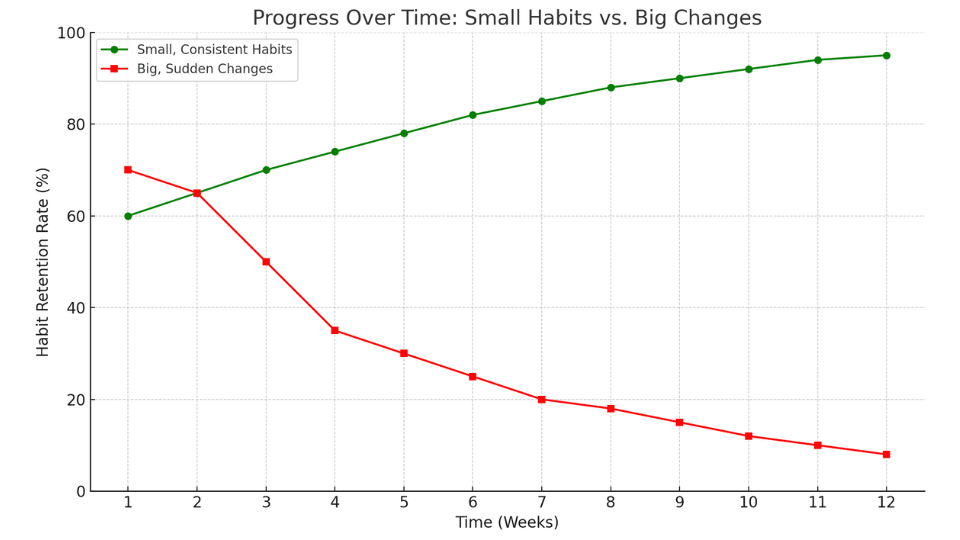Best Cosmetic & Plastic Surgeons in Indraprastha Apollo Hospital Delhi
 29 January,2026
Read More
29 January,2026
Read More
Enquire now in case of any assistance needed
 31 May,2025
31 May,2025

Healthy habits are the foremost discipline that should be ingrained in our minds. It also helps you achieve peak performance in your professional life.
According to the National Library of Medicine, healthy habits in the long term reduce stress levels by up to 32%. Reduced stress levels contribute to achieving peak performance during work and also help scale productivity. Additionally, a social experiment was conducted in the US workforce, where the organisation found that when employees were mindful of their habits, it significantly increased the organisation’s productivity.
But there is a glitch.
Creating lasting healthy habits is often easier said than done. Whether you’re looking to improve your fitness, nutrition, or mental well-being, building habits that truly stick requires a thoughtful approach.
In this step-by-step guide, we’ll explore science-backed strategies for habit formation, share inspiring examples, and provide actionable tips to help you make positive changes that last.
Fill up the form and get assured assitance within 24 hrs!
Healthy habits are the foundation of a well-balanced life, supporting long-term energy, better sleep, and overall well-being. Research indicates that small, consistent changes, such as regular exercise, a nutritious diet, and effective stress management, can have a profound impact on overall well-being. It can lead to significant improvements in both physical and mental health. Unlike quick fixes or fad trends, healthy lifestyle habits are sustainable and promote vitality for years to come.
The blog aims to provide mindful steps that will ensure your chosen healthy habit is retained for a lifetime. Here is the first step towards a meaningful life.
Start by selecting a habit that is personally meaningful and specific to you.
Instead of vague goals like “be healthier,” opt for concrete actions such as “add one vegetable to dinner” or “do 5 pushups after brushing my teeth”.
Intrinsic motivation, choosing habits that matter to you, is key to long-term success.
Every successful habit needs a consistent trigger.
Pair your new habit with an existing routine, such as finishing breakfast or arriving at your office. This helps create a strong association and makes the new behaviour automatic.
Begin with a small, manageable version of your habit.
For example, start with a 10-minute online yoga flow or a 15-minute daily walk. As the habit becomes ingrained, gradually increase the complexity or duration of the task.

The graph shows that small, consistent habits steadily grow from 60% to 95% retention over 12 weeks, while big, sudden changes drop sharply from 70% to just 8%. It highlights that gradual changes are more sustainable than drastic shifts when building lasting habits.
Reward yourself for completing your habit. Positive reinforcement strengthens the neural pathways in your brain, making the behaviour more likely to stick.
Celebrate your progress, no matter how small.
Use habit-building apps like Habitica, Strides, or Streaks to monitor your progress and stay accountable.
Tracking helps you visualise your consistency and motivates you to keep going.
Consistency is vital.
Research shows that our bodies and minds thrive on routine. Over time, healthy habits become second nature, seamlessly integrating into your daily life.
Adopting healthy habits doesn't have to mean a total lifestyle overhaul. The most impactful habits are often the simplest ones, leading to overall wellness. Small, consistent actions that compound over time. Here are some easy, realistic, and inspiring examples across different areas of well-being to help you get started:
Physical activity doesn’t have to involve a gym membership or long, grueling workouts. Simple movements performed consistently can significantly improve your energy levels, mood, and overall well-being. Try these:
Healthy eating starts with simple changes. It’s not about restriction, but rather about making better choices more consistently:
Mental clarity and emotional balance are just as important as physical health. These small habits help reduce stress and increase mindfulness throughout your day:
Pro Tip: Pick just one habit from each category and focus on doing it consistently for a week. Once it feels natural, add another. The key is not perfection but progress.
As we mentioned earlier, the key to longevity and mindful living is not about turning life upside down or adopting intermittent fasting. However, if that's your vibe, then go for it. But you don’t need to do it.
It is about making small, intentional changes and staying consistent over time. Breaking down big goals into manageable actions makes them achievable and less overwhelming in the brain. It can be as simple as drinking more water, taking a short walk, meditating for five minutes, or choosing healthier meals.
Each step is a promise to be better, fitter, and more productive the next day. This is also the key to lasting change and positive reinforcement. Repeating them over a long period of time makes it more automatic rather than a tedious task.
Another crucial aspect is to celebrate small wins, track your progress, and reward yourself. Your healthy habits are the identity of your future. Stick with it and watch the ripple effect, which will be visible in every aspect of your life.
Fill up the form and get assured assitance within 24 hrs!
B.Sc in Media Science from NSHM Knowledge Campus, Kolkata, 2019-2022
Suryani Dutta is an experienced content writer, specializing in healthcare and medical tourism. With a B.Sc. in Media Science from NSHM Knowledge Campus, Kolkata, she creates engaging, accurate, and SEO-friendly content that empowers patients to make info
Dr. Charu Gauba is a Neurologist with over 32 years of experience. She specializes in various neurological procedures, such as Cerebrospinal Fluid Shunt, Spinal Tap, Digital Subtraction Angiography (DSA), Ventriculoperitoneal Shunt, and Brain Mapping....
Senior Consultant
Medical Oncologist
Nanavati Super Specialty Hospital, Mumbai
WhatsApp UsSenior Director
Gynecologist and Obstetrician, IVF Specialist
Max Super Speciality Hospital, Shalimar Bagh, New Delhi
WhatsApp UsSenior Director
Gynecologist and Obstetrician, IVF Specialist
Max Smart Super Speciality Hospital, Saket, New Delhi
WhatsApp UsSenior Director
Gynecologist and Obstetrician
Max Smart Super Speciality Hospital, Saket, New Delhi
WhatsApp UsSenior Director
Gynecologist and Obstetrician
Max Smart Super Speciality Hospital, Saket, New Delhi
WhatsApp UsSenior Director
Gynecologist and Obstetrician
Max Smart Super Speciality Hospital, Saket, New Delhi
WhatsApp UsThe Art of Effective Communication
 27 January,2026
Read More
27 January,2026
Read More
 20 January,2026
Read More
20 January,2026
Read More
 16 January,2026
Read More
16 January,2026
Read More
 13 January,2026
Read More
13 January,2026
Read More
 09 January,2026
Read More
09 January,2026
Read More
Trusted by Patients
"I am Asim from Bangladesh and was looking for treatment in India for neuro. I visited many websites to get the complete information regarding the treatment but I was not satisfied as I was getting confused. In the meanwhile, one of my friends suggested I seek help from Medi Journey as he experienced his medical journey very smoothly and was satisfied with it. They have filtered the top 10 doctors as per experience, the success rate of surgery & profile, so it helps us to choose the best treatment in India. "
"For my knee surgery, Medi Journey guided me to BLK Hospital where I received exceptional care. The team's support and the expertise at BLK Hospital exceeded my expectations. Thank you Medi Journey for making my medical journey stress-free. "
"I came from Iraq for my granddaughter's eye surgery in India facilitated by Medi Journey, due to critical cases they advised us to get a second opinion from the different hospitals before going to surgery. Finally, we went to Fortis Escort Hospital, which helped us to get more confidence for diagnosis. Fortis Escort Hospital has the best eye surgeon team with the latest instruments. Thanks to all team members for providing a high-quality treatment in India at an affordable cost. "
"I came for my hair transplant in India, before coming I was so confused about choosing the best clinic and surgeon for me. But thanks to God one of my friends had a hair transplant in India through Medi Journey. He recommended me to go with them. I am completely happy with my experience with them. They were always very fast in their responses to me. the success rate of my hair transplant surgery is 100%."
"Artemis Hospital, suggested by Medi Journey, turned out to be a great choice for my treatment. The personalized assistance and medical care were exceptional. I'm grateful to Medi Journey for guiding me to a hospital that perfectly matched my needs. Highly recommended! "
"I came from Afghanistan for my treatment in India at Jaypee Hospital, Noida. I had a fantastic experience with Medi Journey. Kudos to them for their incredible support during my medical journey. They not only took care of all the logistics but also connected me with a fantastic healthcare team. Efficient, caring, and highly recommended for a hassle-free medical tourism experience."
"I am Adam from Kano, Nigeria, one of my friends from Nigeria was facilitated by Medi Journey, and he recommended us to go with them. I sent my all reports to them and within 48 hours they reverted with 4 options from different hospitals. They helped me to get a Visa letter from the hospital, arrange pick-up from the airport, and book a hotel for me. Their team is very honest and throughout our stay in India they are with us they are caring for us like his family members. BLK Hospital is the best hospital in India with a top surgical oncologist surgeon team, a very advanced OT, and a Radiotherapy department. I wish more success to Medi Journey. "
"Great experience at the Max Hospital for my spine surgery and was successfully done. I thank my neurosurgeon and his entire team. I recommended all of my country's people to Medi Journey for treatment in India, they choose the best hospital, the best doctors, and the best cost for patients."
"I came to India from Dhaka, Bangladesh for my father-in-law's cardiac surgery at Fortis Hospital. I was confused about choosing the best surgeon for him before coming, but their team helped me to choose the best hospital and best cardiac surgeon in India with very good cost and 100% success rate of surgery. I am very happy with the services, really they make my journey so comfortable that make me feel at home. Thanks again and I like people to choose "Medi Journey" as your travel guide. "
"I am Mohammad from Bangladesh came to India for my general health checkup. Medi Journey offers me the complete package including Pick-up from the airport, hotel services, and 24-hour assistance. They guide you to choose the best hospital in India, the best cost of treatment with top-most doctors and give you complete information about hotel booking, and pick-up from the airport before coming to India They have the best team to help. Always choose Medi Journey for your treatment in India."





